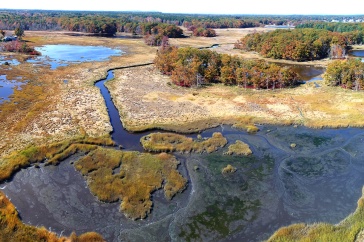
No stranger to international travel for his research, Erik Hobbie stands next to a colleague at the Qingyuan Experimental Station in China during a previous fellowship abroad.
Erik Hobbie, a research scientist in the UNH Earth Systems Research Center, has been awarded two fellowships to continue his stable isotope research abroad in China and Austria.
The first fellowship will take place later this year at the Institute of Applied Ecology, a division of the Chinese Academy of Sciences in Shenyang, China. During his tenure, Hobbie will work with a team of colleagues and graduate students to assess changes in forests using stable isotope technology, with a particular focus on how forests are responding to the high levels of nitrogen deposition in China. The fellowship is part of efforts by regional and national Chinese governments to promote foreign scholars to visit and to build connections for Chinese scientists to get international experience. Hobbie first visited Shenyang in 2018 during a previous fellowship at Kyoto University in Japan and has hosted three visiting scientists from China in the last four years.
“It’s an exciting time to be in China as the government is putting lots of resources into increasing their scientific capacity. They realize that their rapid development of the past 30 years is causing many environmental issues” Hobbie says.

Hobbie has also been awarded a Fulbright Fellowship to work at the Natural History Museum in Vienna, Austria, from March - June, 2022. While there, he will study how small mammals help to maintain healthy forest ecosystems through eating and dispersing fungi, like mushrooms and truffles. Trees rely on these fungi to obtain nutrients and in return supply the fungi with sugars. These fungus-root relationships are damaged by the high levels of nitrogen deposition recently experienced in China and that began to increase in Europe after World War II. The museum’s mammal collections go back to the 1930s, when nitrogen deposition levels were low. These specimens will be used by Hobbie to test how diets of mushroom-eating mammals may have changed in response to rising levels of nitrogen deposition in European forests. The mammals’ diets can be assessed by measuring isotopic ratios of carbon and nitrogen in hair samples, specifically in essential and non-essential amino acids of the hair protein. This research builds from ongoing collaborations of Hobbie with UNH mammologist Becca Rowe and post-doctoral associate Ryan Stephens.
"During the Fulbright, I will also be working closely with a research group at the University of Natural Resources and Life Sciences in Vienna, as they have the expertise to do the compound-specific measurements on amino acids that we can't do at UNH. The Fulbright will be a unique opportunity to use museum specimens as a window into the past to answer ecological-scale research questions that link trees, symbiotic fungi, and small mammals."
The Institute for the Study of Earth, Oceans, and Space (EOS) is UNH's largest research enterprise, comprising six center with a focus on interdisciplinary, high-impact research on Earth and climate systems, space science, the marine environment, seafloor mapping, and environmental acoustics. With more than $60 million in external funding secured annually, EOS fosters an intellectual and scientific environment that advances visionary scholarship and leadership in world-class research and graduate education.
















































